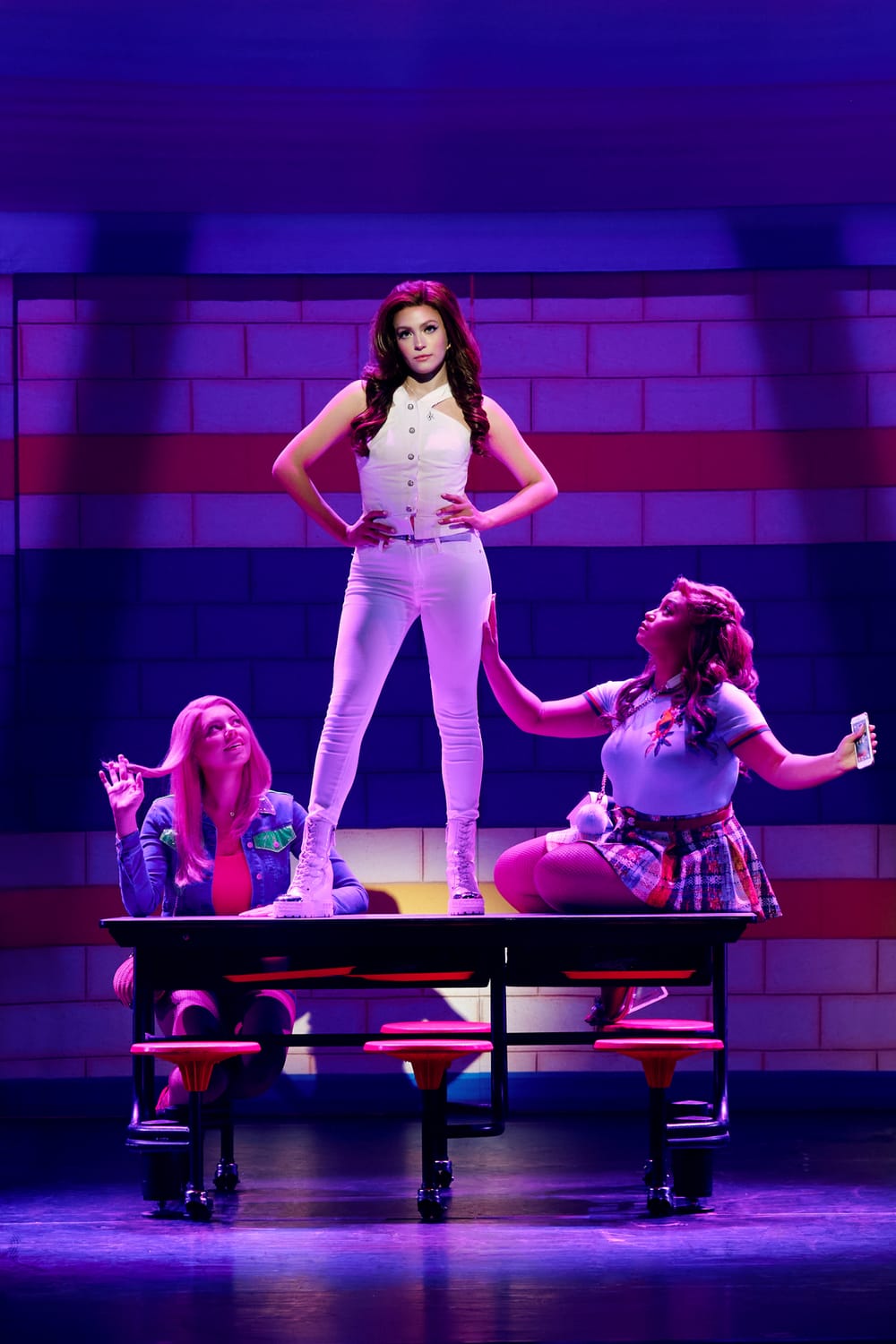Stay in the Loop
BSR publishes on a weekly schedule, with an email newsletter every Wednesday and Thursday morning. There’s no paywall, and subscribing is always free.
So you agree, you think this is really funny?
The Kimmel Cultural Campus and the Shubert Organization present the national tour of Tina Fey’s Mean Girls

Before the mid-week Philly performance of the current Mean Girls national tour (running at the Miller Theater through Sunday, October 8), I joined a long line of ticketholders on Broad Street wearing every possible shade of pink—because you know what we do on Wednesdays. My only pink clothes are a few old socks, so as I joined the queue in my sensible blue sweater, I hoped there was no real-life Regina George behind me.
I walked in wondering whether the musical updates cringey elements of the wildly popular original film co-written by Tina Fey (starring Lindsay Lohan and Rachel McAdams alongside Fey herself as a wry calculus teacher). Fortunately, Fey’s book hews to non-racialized descriptors, unlike the movie’s cafeteria tour. But the musical happily carries the film’s weird central premise that Cady has never had a human friend because she grew up in Africa (specified as Kenya in the musical).
Kenya has “almost no people, just animals and sky,” Cady sings. In reality, Kenya has major cities, a powerful economy, and a population of more than 55 million people—only one percent of whom are of non-African origin—so when Cady says there are “almost no people” there, it’s worth asking who qualifies as a person in her worldview and why it was impossible for a white girl to socialize until she moved to Illinois. (People have been pointing out for years that Fey has a long history of racist missteps.)
Fugly punchlines
The musical also maintains the film’s mantra that gaining a few pounds is a fate worse than death. After Cady tricks Regina into taking high-calorie supplements left over from Kenya (apparently the Heron family fed the local children, all of whom were starving, but didn’t befriend them), Regina’s rear end balloons thanks to a tiny fat suit that may leave the audience confused over whether she has gained weight (the horror) or hired the Kardashians’ plastic surgeon. A modicum of body diversity in the cast makes Fey’s ongoing altar to white skinniness harder to bear.
Regina’s weight gain makes her own followers ostracize her, and then they sing an ecstatic song about feeling free and fearless. I’m reminded of recent complaints by high-profile right-wing women who joined their male cohorts in decrying feminism, only to be shocked and dismayed when this did not protect them from misogynistic comments. This musical is no better, punting the same toxic rules around and calling it empowerment.
The show also delivers a string of tasteless punchlines about opiate addiction, apropos of nothing in the plot. These join several hideous tonal clashes, as when Karen emerges in the middle of a peppy song to describe becoming the victim of a child pornographer, drawing a gasp from the audience before the horrifying vignette subsides into an ensemble member chirping that maybe guys shouldn’t do things like that. The famous “fugly slut” line from the movie is changed to “fugly cow” here, but a new joke in which school sexual predator Coach Carr calls girls “deranged” because of their “whoremones” (yes, he writes it out) gets center stage.
Mean Girls without the bite
The musical maintains most of the plot and a lot of iconic dialogue from the film, simplified to make room for plenty of classic Broadway-style song-and-dance numbers, but as momentary spotlights appear on characters declaiming a procession of favorite lines from the film (“she doesn’t even go here!”), the quips lose the funny, subversive bite that made them so memorable. The audience roars along because they love the film, not because this material works onstage.

The musical reduces beloved besties Janis and Damian (here, Alexys Morera and recent Friends Central graduate Ethan Jih-Cook, a powerful young voice) to a kind of chorus, periodically stopping the action to verbally telegraph anything otherwise approaching subtlety.
Jih-Cook isn’t the only local talent here: ensemble member Mikaela Rada is a UArts alum, and MaryRose Brendel, who brings gangly, sympathetic charm to the role of un-brainy beauty Karen Smith, is a recent Penn State musical theater grad. A likeable Natalie Shaw as Cady, a slinky Maya Petropoulos as Regina George, and Kristen Amanda Smith as a heartfelt Gretchen Weiners, plus Morera and Brendel, are all world-class clarion belters, but their voices are so similar that it’s hard to distinguish the singers by ear.
An unsuccessful update
The original Mean Girls premiered when I was in college. It was the year I switched from a dorm-room landline to carrying a Nokia, the same year a sophomore at Harvard launched The Facebook. Like the original Plastics, we had cellphones but were still on the precipice of social media.
My biggest question heading into the musical (which opened on Broadway in 2018) was whether it keeps the original’s early-2000s roots or if it’s updated to the social-media era. The answer, unfortunately, is yes on both counts (and not just because Gen Z is low-key obsessed with the low-cut jeans, microscopic pleated skirts, and frosty make-up that plagued my generation at the turn of the century).
Fey’s book and Nell Benjamin’s lyrics wedge in some self-conscious, sarcastic jabs at selfies, comment sections, and hashtags, and Gretchen sings that she feels like an iPhone without a case (tons of great features; prone to getting smashed), but the show otherwise makes little effort to consider or portray Gen Z’s digital world—a real failing given the themes of false friendship and the identities we construct. I wonder why the setting was updated at all.
Some well-designed projections and sound could bring us into the girls’ online life or at least let us see the pages of the infamous Burn Book. Instead, we stare at set designer Scott Pask’s faux tile walls while lockers, bathroom stalls, and desks that could be from any time in the last century roll in and out. Then, we’re supposed to believe that a Regina George who’s on Instagram would use a copy machine to spread nasty gossip. It’s a sad state of affairs for a movie that launched a million memes.
Ultimately, the most potent message the musical manages about the digital world is Damien and Karen’s act two opening number: “Stop.” As in, just stop replying to those texts, just stop posting online. A groundbreaking insight for today’s high schoolers. I wish it could apply to the march of this messy, unfunny, nostalgia-bait musical, but a film version is on the way.
At top: From left, MaryRose Brendel as Karen Smith, Maya Petropoulos as Regina George, and Kristen Amanda Smith as Gretchen Wieners. (Photo by Jenny Anderson.)
What, When, Where
Mean Girls. Book by Tina Fey, music by Jeff Richmond, and lyrics by Nell Benjamin; directed by Casey Hushion, after original direction and choreography by Casey Nicholaw. $54-$134. Through October 8, 2023, at the Miller Theater, 250 S Broad Street, Philadelphia. (215) 893-1999 or kimmelculturalcampus.org.
Accessibility
The Miller Theater is a wheelchair-accessible venue. Tickets can be purchased by calling patron services at (215) 893-1999 or by emailing [email protected].
Sign up for our newsletter
All of the week's new articles, all in one place. Sign up for the free weekly BSR newsletters, and don't miss a conversation.

 Alaina Johns
Alaina Johns